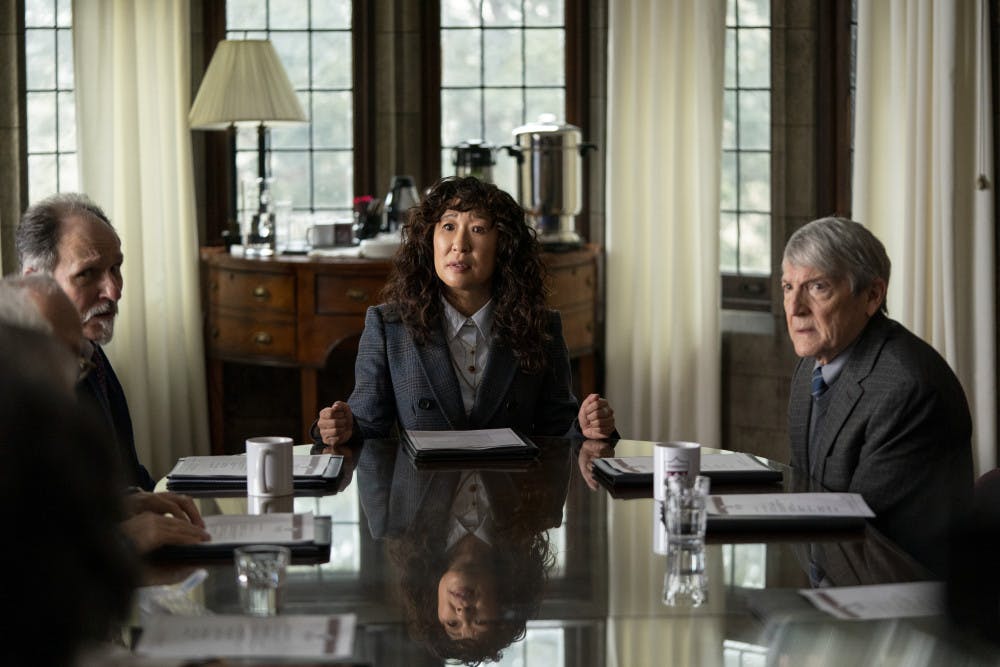By now, you should have heard of “The Chair.” Starring a blazer-clad Sandra Oh, the Netflix original released Aug. 20 caters to the bookish, academic, higher ed-obsessed niche of the American population. If you’ve heard a lot about it, chances are you fit into that niche. And if you fit into that niche, you’ll probably like “The Chair.”
Taking place on the fictional Pembroke University campus (sound familiar?), the show follows a dying English Department at an Ivy-ish institution in the throes of financial cuts and cultural upheaval. The chair herself, Jin-Yoon (Oh), is a powerhouse professor-turned-administrator who enters into the position just as the department begins to crumble. In the first episode, Bill Dobson (Jay Duplass), a widower and possible love interest for Jin-Yoon, goes viral after drunkenly doing the Nazi salute in a poorly executed joke during a class on fascism and modernism.
The show is propelled by the encroachment of “culture wars” on Pembroke’s campus: Bill faces off against the students who once loved him; the rising star, a Black female professor, argues with the jaded white male professor; the second wave feminist chides the Title IX coordinator’s short shorts. The juxtapositions of these divides manifest on many college campuses, but there is little critical investigation into them on “The Chair.”
Instead of grappling with these complex issues, “The Chair” plays to the viewer’s shallow sympathy for the protagonists. It also counts on the viewer’s disdain for the stereotypical liberal arts student. Bill’s salute is taken out of context, and with his disheveled hair and his poor widowed eyes, you have to feel bad for the guy. The students asking for his resignation only come up with poster-like platitudes such as “No Nazis at Pembroke” and “Hate has no home here.” “The Chair” makes you root for the alcoholic, shameless, inappropriate professor because the alternative — the reductive Social Justice Warrior students who would rather rap about Moby Dick than read it — are made out to be even more unbearable.
“The Chair”’s politics fall apart under scrutiny, but to disregard the entire project over this failure would be unfair: the show isn’t a political piece, though it may dress up as one. Cloaked in academia’s crimson cloth, “The Chair” masquerades as clever political takes for those invested in the goings-on of higher ed. But really, “The Chair” is just a love-story-sitcom for those nestled in the niche of academia.
The paradox of streaming services is that while more television is being produced than ever before, the offerings are often formulaic reproductions of the same show. “The Chair” is an academic “Friends,” or “Seinfeld,” or to make it more modern, “How I Met Your Mother.” There’s the jester, Joan Hambling (Holland Taylor), who enters the scene for a punchline. There’s the troubled protagonist, Jin-Yoon, who can’t seem to catch a break and will occasionally fall off a chair for laughs. There’s the protagonist’s even-more-troubled love interest, Bill, who we love in theory, and who grows more endearing because of his mistakes.
Producers funnel shows through this beloved format and then douse them in cultural buzzwords to make the work seem catered especially to someone like you: someone with your interests, your profession, your peers, your lifestyle. So when The Alabama Shakes play during a scene in “Fleabag” or when “Master of None” takes you to Italy or when you watch Jin-Yoon quote Emily Dickinson, you know that this show is speaking to you; it’s different, it’s special, it’s enjoyable and lighthearted while also touching all aspects of your less enjoyable and lighthearted life. But what makes these shows enjoyable is that, boiled down, they’re love stories. They’re full of jokes and humor. The characters make mistakes that can be undone.
The ending of “The Chair” is lovely: a climactic faculty meeting leads Bill to tell the administration off, Joan assumes her rightful place as the new chair after decades of disregard, there’s newfound hope for Jin-Yoon and Bill. The ending of a more realistic show, one that would appeal to the same demographic, would be more sinister as university budgets are slashed and humanities classes are drained of students. But that show wouldn’t be successful. Jin-Yoon, the charming intellectual herself, would rather watch “The Chair.” So would I.





